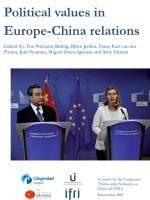Denmark’s “active but discreet” human rights diplomacy towards China
Despite having committed itself to promoting liberal-democratic values in its official strategy on Danish foreign policy, the current Danish government rarely addresses Chinese human rights violations publicly. Instead, the Danish government, in its bilateral relations with China, pursues an active, but discreet and largely non-consequential diplomatic line with respect to sensitive political issues like liberal human rights.
These are some of the main findings presented by Andreas Bøje Forsby in a new report published by The European Think-tank Network on China (ETNC), examining the relevance of political values in relations between Europe and the People’s Republic of China.
In the report, China experts from 17 leading European research institutions from across the continent compare the role played by political values in bilateral relations. In essence, the results display four different patterns of behaviour among European countries when it comes to addressing sensitive political issues in their relations with China: (1) vocal and active; (2) active, but discreet; (3) passive; and (4) passive and potentially counteractive.
DIIS has contributed to the report with a chapter entitled “Discreet Diplomacy: Denmark’s Pragmatic Stance Towards China”. In this chapter, Andreas Bøje Forsby argues that Denmark can be placed in the second category as “active, but discreet” when compared to other European countries. More generally, over the past couple of decades, Denmark has deliberately lowered its voice on issues that are politically sensitive to Beijing while eagerly pursuing a closer and more diversified relationship with China, as envisaged in the Comprehensive Strategic Partnership agreement from 2008. In the meantime, China has become Denmark’s second-largest trade partner outside Europe.
At a comparative European level, the report identifies three factors that can explain the different approaches to China adopted by the seventeen European countries examined in the report:
First, while there has been a general downgrading of the importance of political values in the approaches to China by most European states, younger democracies have been more affected by this trend.
Second, states with a higher per capita gross domestic product tend to be more active in the field of political values in their relations with China. Close trade relations with China also correlate with a higher level of activity in this field. In general, the share of Chinese investment does not make a major difference. Instead, investment in strategic sectors of the economy or the hope of attracting Chinese money to fill investment gaps appear to be more decisive factors.
Third, Chinese pressure has led some European states to reconsider their level of activity in promoting democracy, human rights and the rule of law. Even so, they have not taken political values entirely off the agenda.
DIIS Experts


